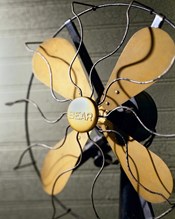Warmer temperature already here and soon air conditioners and fans will be going full blast.
With that in mind the U.S. Department of Energy has released this list of energy efficient tips to stay cool this summer:
> Change to More Efficient Light Bulbs. Change out incandescent light bulbs with more energy-efficient lighting choices. Energy Star qualified lighting not only uses less energy, but also produces approximately 75 percent less heat than incandescent lighting, so cooling bills will be reduced, too.
> Find the Best Thermostat Settings. If you have a programmable thermostat, program it to work around your family’s summer schedule—set it a few degrees higher (such as 78 degrees) when no one is home, so your cooling system isn’t cooling an empty house.
> Use Ceiling Fans Optimally. Run your ceiling fan to create a cool breeze. If you raise your thermostat by only two degrees and use your ceiling fan, you can lower cooling costs by up to 14 percent. Remember that ceiling fans cool you, not the room, so when you leave the room make sure to turn off the fan.
> Maximize Shade. Pull the curtains and shades closed before you leave your home to keep the sun’s rays from overheating the interior of your home. If you can, move container trees and plants in front of sun-exposed windows to serve as shade.
> Reduce Oven Time. Use a microwave instead of an oven to cook, when you can. Ovens take longer to cook food and can make your house warmer, requiring your AC system to turn on to keep the house at a comfortable temperature.
> Check Air Conditioner Filters. Check your cooling system’s air filter every month. If the filter looks dirty, change it. A good rule is to change the filter at least every three months. A dirty filter will slow air flow and make the system work harder to keep you cool—wasting energy. Also, remember to have your system serviced annually to ensure it’s running at optimum efficiency for money and energy savings.
> Plug Duct System Leaks. As much as 20 percent of the air moving through your home’s duct system is lost due to leaks and poor connections. Seal duct work using mastic sealant or metal tape and insulate all the ducts that you can access (such as those in attics, crawlspaces, unfinished basements, and garages). Also, make sure that connections at vents and registers are well-sealed where they meet floors, walls, and ceilings. These are common locations to find leaks and disconnected ductwork.
For those wanting to learn more about air conditioning, Cornell Cooperative Extension has three facts sheets available on air conditioner operation: Energy Efficient Air Conditioning, Room Air Conditioning and Maintaining Your Air Conditioner.





